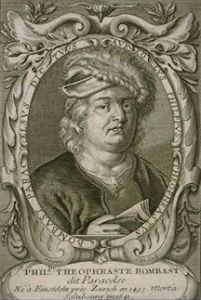I was reading The Iron Trial by Holly Black and Cassandra Clare, and as I followed Call as he sneaked through the caves with the help of a talking lizard, he came across a door. Above the door was the following:
Thoughts are free and subject to no rule.
I put the book down; Call would have to wait. This quote felt like it was a part of me, and I wanted to know more about it. After a quick Google search, I discovered that it came from a man named Philippus Aureolus Theophrastus Bombastus von Hohenheim, who published under the name Paracelsus, which means “greater than Celsus” (a reference to the first-century Roman encyclopedist Aulus Cornelius Celsus.
Paracelsus was a Renaissance physician, botanist, alchemist, astrologer, and occultist. He pioneered the use of chemicals and minerals in medicine and was among the first to suggest that illness was the result of an attack on the body by outside agents, according to goodreads.com.
Today, he is most known for his contributions to alchemy and his magical theories, which stood in contrast to Cornelius Agrippa and Nicolas Flamel. Paracelsus rejected the philosophies of Aristotle and Galen, but he did accept the concept of the four elements, as water, air, fire, and earth. He saw them as a foundation for other properties on which to build.
The following is courtesy of Wikipedia:
From his study of the elements, Paracelsus adopted the idea of triparite alternatives to explain the nature of medicine, taking the place of a combustible element (sulphur) a fluid and changeable element (mercury) and a solid, permanent element (salt.) The first mention of the mercury, sulphur, salt model was in the Opus paramirum dating to about 1530 Paracelsus believed that the principles sulphur, mercury, and salt contained the poisons contributing to all diseases.
Poison is in everything, and no thing is without poison. The dosage makes it either a poison or a remedy.
He saw each disease as having three separate cures depending on how it was afflicted, either being caused by the poisoning of sulphur, mercury, or salt. Paracelsus drew the importance of sulphur, salt and mercury from medieval alchemy, where they all occupied a prominent place. He demonstrated his theory by burning a piece of wood. The fire was the work of sulphur, the smoke was mercury, and the residual ash was salt.
The art of healing comes from nature, not from the physician. Therefore the physician must start from nature, with an open mind.
Paracelsus also believed that mercury, sulphur, and salt provided a good explanation for the nature of medicine because each of these properties existed in many physical forms. With every disease, the symptoms depended on which of the three principals caused the ailment.Paracelsus theorized that materials which are poisonous in large doses may be curative in small doses; he demonstrated this with the examples of magnetism and static electricity, wherein a small magnet can attract much larger metals.
The tria prima also defined the human identity. Sulfur embodied the soul, (the emotions and desires); salt represented the body; mercury epitomised the spirit (imagination, moral judgment, and the higher mental faculties). By understanding the chemical nature of the tria prima, a physician could discover the means of curing disease.
He who is born in imagination discovers the latent forces of Nature. . . . Besides the stars that are established, there is yet another — Imagination — that begets a new star and a new heaven. – Paracelsus
Man is a microcosm, or a little world, because he is an extract from all the stars and planets of the whole firmament, from the earth and the elements; and so he is their quintessence. -Paracelsus
That which the dream shows is the shadow of such wisdom as exists in man, even if during his waking state he may know nothing about it… We do not know it because we are fooling away our time with outward and perishing things, and are asleep in regard to that which is real within ourselves. – Paracelsus
After the collapse of the Reformation, Paracelsus underwent a conversion experience. He began to re-evaluate his natural philosophies in terms of religion, and rejected much of it as incompatible with his new religious feelings. He remained a Catholic, but rejected much established Catholic dogma, such as the ressurection of the flesh and the immortality of the soul. His religious philosophy was that of the simple life, with salvation secured not by works or by faith, but by love. Still later, he reconciled himself with science, and published his great synthetic treatise Philosophia Sagax.
Paracelsus is a man truly beyond his time. It is vital that we don’t forget the men and women from out past who saw so much. Be inspired to learn something new today. Be inspired to step outside of what is conventional and allow your mind to edge closer to its own truth.


August 19, 2015 at 7:31 pm
Quote leadeth to amazing find. 🙂